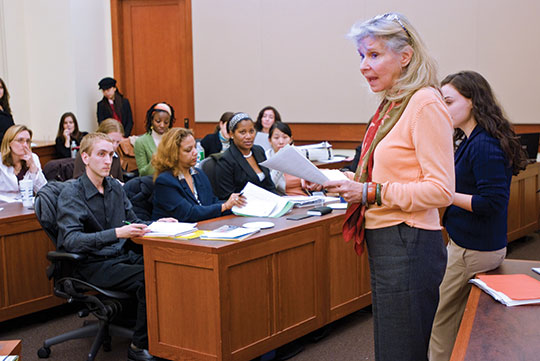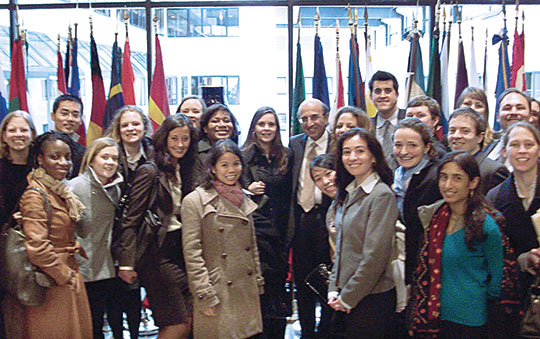Inside the Beltway
A unique, five-day experience immerses TC students in the world of education policy
A unique, five-day experience immerses TC students in the world of education policy
By Patricia Lamiell
Will the No Child Left Behind Act get renewed?
Is the country moving toward national education standards?
And what about that funding cliff that’s looming in 2012?
Each of those questions reflects one of the emerging political dramas of our era: the mounting tension between the federal and state government over control of education policy.
It’s a battle most of us have watched play out in the media or at our local schools—but this past January, 27 students in TC’s annual Federal Policy Institute got the chance to observe it at ringside in Washington, D.C.
On one side of the fight are those who believe the federal government has a “moral calling to take on the country’s lowest performing schools, which are really doing a disservice to their country,” Judy Wurtzel, Deputy Assistant Secretary in the Office of Planning Evaluation and Policy Development at the U.S. Department of Education, told the students. On the other are those who argue that control over education policy should remain where it has been throughout most of the nation’s history: with state and local governments.
The Federal Education Policy Institute is an intensive five-day boot camp developed and run annually during winter break by Sharon Lynn Kagan, Marx Professor of Early Childhood and Family Policy, and Co-Director of TC’s National Center for Children and Families. An internationally recognized expert on early childhood education who has advised the White House, states and governments around the world, Kagan provides her students—an eclectic mix representing nearly every department in the College—with a series of lectures, panel discussions and briefings by an A-list of Washington players. There are also visits with Congressional staffers and the U.S. Department of Education.
The Washington visit is part of the popular Federal Policy Institute, a three-credit course first offered in late ’90s and then dramatically re-tooled by Kagan in 2001. The Washington part of the course is organized and co-taught by TC alumnus Michael D. Usdan, Senior Fellow at The Institute for Educational Leadership in Washington.
Like civil rights in the ’60s and Wall Street takeovers in the ’80s, education policy has been a big issue since Congress passed No Child Left Behind (NCLB) in 2002—a move that increased federal muscle in overseeing state education systems. To some degree, NCLB emphasized punitive powers, such as sanctions when schools fail to make average yearly progress toward the law’s goals of universal student proficiency in reading and math.
The Obama administration has furthered bolstered the federal government’s role in education, but in part by proving the truth of the time-honored policy maxim that the carrot is just as important as the stick. The passion of the President and his education secretary, as they have toured the country talking up their agenda, has attracted many young, energetic professionals with political and policy leanings to Washington.
“Education policy is very ‘right now,’” says Crystal Francis, a Manassas, Virginia, native who is enrolled at Teachers College in the master’s degree program in Sociology and Education.
But there have been more direct incentives, as well. In its Race to the Top initiative in 2010, the administration heavily influenced state and local education policy by giving more than $4 billion in competitive federal grants to cash-strapped states in exchange for policy changes that Obama and Duncan both promoted in national speaking tours. Federal funds rose to 10 percent of all education spending, from 8 percent before the Obama programs, Eric Waldo, Deputy Chief of Staff for Policy and Programs at the U.S. Department of Education, told the group.
For the most part, the strategy worked. By early April, 42 states—most of which did not win Race to the Top dollars—had adopted national core standards in math and English language arts. Many had also lifted caps on forming charter schools, as the Department of Education had required of those seeking Race to the Top funds. And proposals to tie teacher pay and tenure to students’ test scores—another Obama-Duncan priority—were passed or under discussion in a number of states by early April.
“We are ambling toward a huge expansion of federal control dressed up as states’ rights,” Kagan told her students.
But the question of whether that trend will continue was also a major focus of the Institute. States are staring down a funding cliff, as last year’s one-time infusion of $100 billion of federal funds (passed in late 2009 as part of the stimulus package) gets spent. Congress approved a $10 billion Education Jobs Fund this year, but state education officials say that money will be used primarily to save teachers’ jobs, not for any durable program reforms. States are anticipating another round of draconian cuts in art, physical education and other programs not included in the core standards. And the budget that was being fiercely debated on Capitol Hill in early April seems likely to provide little or no additional funding to replace the bailout money.
Meanwhile, some states are pushing back against federal intervention. “The question is, what will be the leverage of the federal government to implement these policies,” Usdan said, especially since the U.S. Education Department is “approximately one half the size it was only a few years ago.”
One hotly contested area is science education—which, everyone agrees, must be significantly improved if America is to regain its competitive advantage in the global economy. Following a panel discussion on the Common Core Standards movement, Christopher Lazzaro, a doctoral candidate in Science Education and Policy, noted that states disagree on some major areas of scientific inquiry—and that science education isn’t part of the Common Core Standards that were ratified. Lazzaro told panelist Dane Linn, Director of the Education Policies Division of the National Governors Association, that he was “frustrated” that, without the incentive of federal money, states might never agree on national science standards.
Prior to the Washington trip, the students were prepared and coached. They became familiar with the major education policies they will be hearing about; got grounded in the history and process of educational policymaking; and ploughed through a reading list that included the work of the education historian Carl Kaestle and the education policy analysts Diane Ravitch (Ph.D., ’75) and Eric Hanushek, and Barack Obama’s “Plan for Lifetime Success Through Education.” Following the Washington trip, students prepare a policy paper and mock legislative testimony on the same self-selected topic.
“Understanding the realities of federal policy construction and implementation is essential not only for educational leaders, but also for all who hope to improve the nature of American education,” Kagan wrote in an e-mail. “That understanding is perhaps best derived by combining policy theory and first-hand experience with individuals who make and influence federal educational policy—FPI’s overall goal.”
Typically, the course participants include a contingent of hardcore policy types. Several students this year had already tested the political waters: one worked for President Obama’s 2008 campaign, and others for state or local legislators. But the course typically draws from different disciplines across the College, this year including early childhood and elementary education, science education and international education development, in addition to the Leadership, Policy and Politics program. Thus the cohort in January included a science curriculum specialist for The College Board and a test-taking strategist and private tutor for The Princeton Review, as well as a significant cadre from the arts (including a contortionist and art historian); a radio broadcaster; an apprentice conductor and collaborative pianist; an aspiring art museum administrator; and a theater director.
That diversity is a major selling point.
“As a Ph.D. student, I am so often in classes with the same people,” Lazzaro said. “This class wasn’t like that, and that really rich perspective was the best part.”
Others valued the up-close view of Washington at work. “The course readings were amazing,” said Dorothy Caldone, a master’s student in International Education Development and Policy, “but the Institute put it together for me. It’s like the difference between reading about photosynthesis and doing it in a lab.”
The week’s speakers included several TC alumni, who discussed the practicalities of career building. Alumni David Johns (Ed.D, ’83), Senior Education Policy Advisor to the U.S. Senate Health, Education, Labor and Pensions (HELP) Congressional Committee; MaryEllen McGuire (Ph.D., ’02), Senior Advisor to New America’s Education Program; and Philip Herr (Ph.D., ’88), Director of Physical Infrastructure Issues at the U.S. Government Accountability Office (GAO) talked about their work lives and answered questions.
All three advised getting a broad education and learning to write effectively.
McGuire, who recently left a policy position on the White House staff to go to New America, called it “very gratifying” to have a direct effect on the quality of America’s education and schools.
Johns advised the students to be unfailingly pleasant to the person who answers the phone. The federal government, he said, is a “people business,” and “D.C. is incredibly small.” In the fast-moving, fluid world of Washington politics, “the next day, that person might be conducting your job interview.”
For Crystal Francis, that lesson was driven home immediately. At the annual reception for D.C. alumni held in conjunction with the Federal Policy Institute and hosted by President Susan Fuhrman, Francis was told about an education policy fellowship opening on Capitol Hill by alumna Betsy McIntyre, a former congressional aide.
“Federal Policy Institute graduates understand how to juggle policy, political and fiscal issues—which sometimes conflict—to make sound Federal policy,” McIntyre said later. “You can’t get that kind of real world experience in a classroom—you’ve got to come down here to see how it really works, or doesn’t!”
Francis didn’t apply, opting to finish her studies, but was impressed with the value of the TC connection. “After the week, I was starting to feel like I’m really ready,” she said. “You shouldn’t be allowed to leave here with a policy concentration, without taking this course.”
Published Friday, May. 20, 2011

